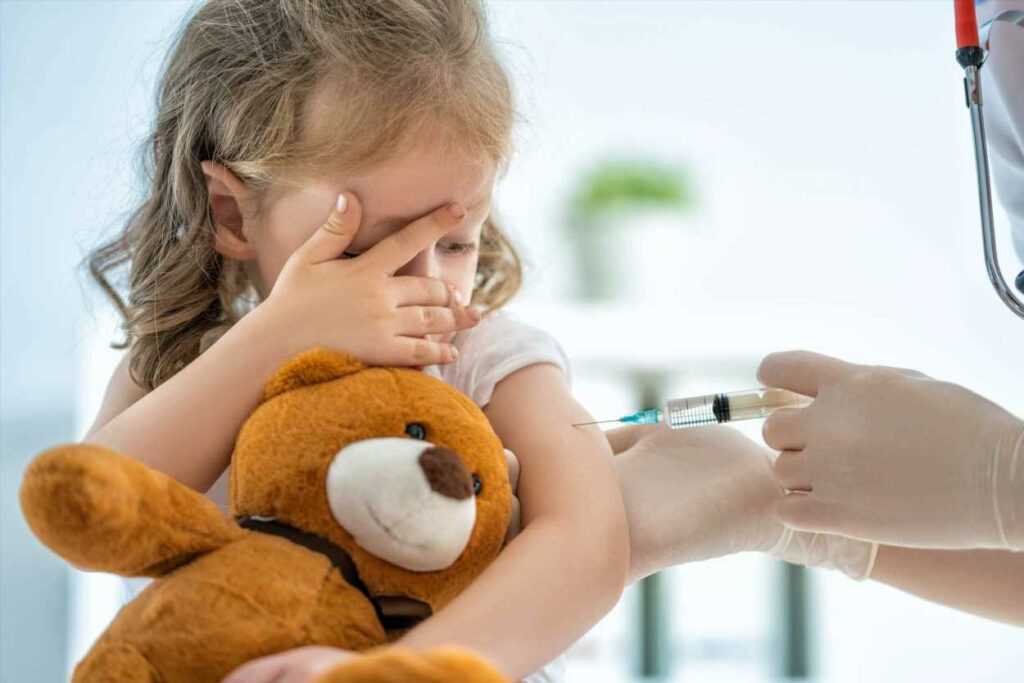Warning to parents as 1 in 10 kids at risk of deadly Victorian diseases – how to protect your child | The Sun

HEALTH experts are urging parents to get their children jabbed against measles, mumps and rubella after a "worrying" drop in the uptake of routine vaccines.
Only 92.5 per cent of children had the first dose of the MMR jab at five years old by 2022/23, while five-year-olds who had the second jab was at 84.5 per cent.
The figures, which suggest more than one in 10 are at risk of disease, represent the lowest level in 12 years, since 2010-11.
The British Society for Immunology said the fall in vaccine uptake is "worrying" considering measles cases are currently "on the rise" in England.
The dangerous bug can lead to severe problems if it spreads to other parts of the body, such as the lungs or brain, including pneumonia, meningitis, blindness and seizures.
The warning comes as vaccination programmes across England failed to meet the uptake recommended by the World Health Organisation (WHO) for the year 2022/23.
Read more on childhood disease

Warning to parents as 1 in 4 kids face 21-day isolation as measles cases surge

What are measles and can you get it if you’ve had the MMR vaccine?
WHO recommends that, nationally, at least 95 per cent of children have jabs for diseases that can be stopped by vaccines, in order to prevent outbreaks.
However, NHS data showed no routine vaccine programme met the threshold during the 12-month period.
In the UK, babies are offered immunisation against meningitis B and rotavirus at eight weeks old.
They are also given the "6-in-1" jab, which helps fight polio, tetanus, whooping cough, diphtheria, hepatitis B and haemophilus influenzae type b – a bacteria that can cause life-threatening infections.
Most read in Health

New Covid fears after school is forced to close after surge in Pirola cases

I was so fat I went blind after secret McDonald’s – I’ve lost 7st eating curry

Popular habit gives a ‘natural high just like cannabis’, says Dr Michael Mosley

Mum, 42, ‘perfectly fine’ before rolling out of bed unresponsive and dying
The doses are topped up at 12 weeks and 16 weeks.
In 2022/23, 91.8 per cent of babies in England had the 6-in-1 vaccine by their first birthday, with 93.7 per cent up to date with the pneumococcal vaccine and 91 per cent protected against meningitis B.
Only 88.7 per cent were vaccinated against rotavirus, which can cause diarrhoea in infants.
Prof Helen Bedford, Professor of Child Public Health at University College London (UCL), urged parents not to delay making sure their children’s MMR jabs are up to date
She said: "It is never too late to be vaccinated and I urge parents and young people to check their vaccination status, this can be done by looking in their child’s red book.
"If in doubt, check with the GP practice and where a child or young person is not fully vaccinated they can have MMR vaccine at their GP surgery."
Dr Doug Brown, chief executive of the British Society for Immunology, said: “It is particularly worrying that today’s statistics show that only 84.5 per cent of children receive the second MMR vaccine dose by age five – well below the 95 per cent level recommended by the WHO.
“Measles is one of the world’s most contagious diseases and cases are currently on the rise in England."
Separate data from UKHSA found measles cases in England have reached a three-year high, with 141 confirmed cases recorded between January and July 2023.
Dr Doug added: "We must ensure that vaccination rates improve to stop the spread of measles and give our communities the best possible protection available against this serious illness."
Practical issues as a result of the NHS crisis are thought to be one of the key reasons behind falling uptake.
Prof Helen, previously told The Sun the low jab numbers could be down to the national shortage of healthcare workers.
"We currently have a shortage of GPs, nurses and health visitors, which means parents are getting less support when it comes to looking after new babies.
"The fall in health visitors in particularly concerning," she added.
"Often, health visitors are the only people to discuss vaccinations with parents."
Data from NHS Digital reveals there were 5,870 health visitors in July 2022, a drop of 43 per cent from its peak of 10,309 in October 2015.
"All these things conspire to knock immunisation rates down," she added.
READ MORE SUN STORIES

I'm a cleaner, 5 things I'd never put in my house – including a kitchen handle

Paris Fury shares sleepy selfie & baby update after day of 'normal life'
Measles symptoms include a classic blotchy reddish brown rash, as well as a fever and sore, red eyes.
Most people start to get better with bed rest after around a week but people should call their GP or NHS 111 if they think there is a case in their home.
Vaccinations and when to have them
IT’S important that jabs are given on time for the best protection, but if you or your child missed a vaccine, contact your GP to catch up
8 weeks old
6-in-1 vaccine
Rotavirus vaccine
MenB vaccine
12 weeks
6-in-1 vaccine (2nd dose)
Pneumococcal vaccine
Rotavirus vaccine (2nd dose)
16 weeks
6-in-1 vaccine (3rd dose)
MenB vaccine (2nd dose)
Vaccines for children aged 1 to 15
1 year
Hib/MenC vaccine (1st dose)
MMR vaccine (1st dose)
Pneumococcal vaccine (2nd dose)
MenB vaccine (3rd dose)
2 – 15 years
Children's flu vaccine (every year until children finish Year 11 of secondary school)
3 years and 4 months
MMR vaccine (2nd dose)
4-in-1 pre-school booster vaccine
12 – 13 years
HPV vaccine
14 years
3-in-1 teenage booster vaccine
MenACWY vaccine
Credit: NHS
Source: Read Full Article
